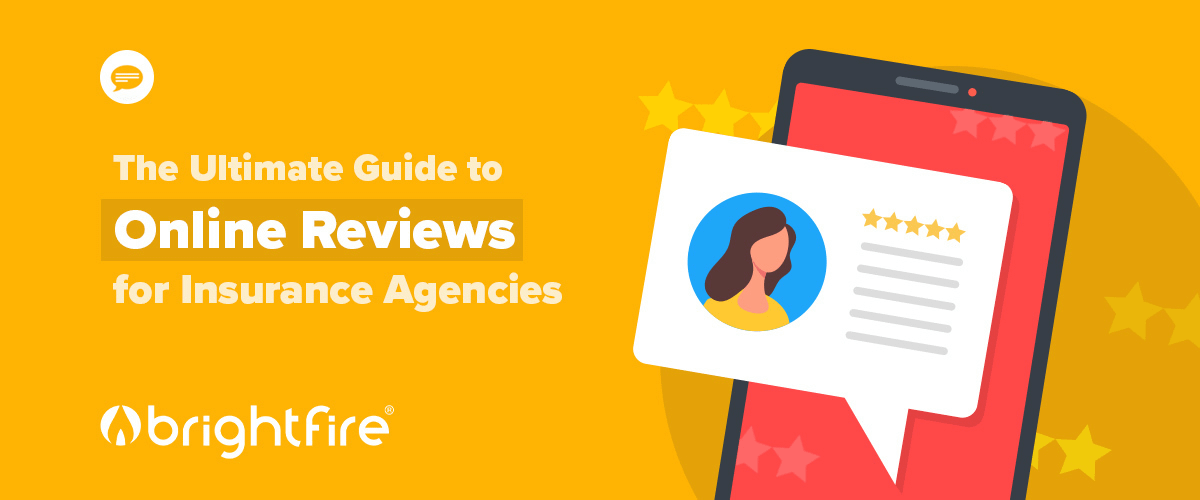In 2024, having a positive online presence is key to an agency’s success in the modern marketplace of insurance and connected customers. Along with websites, blogs, and social media profiles, positive online reviews can play a defining role in the success of your agency. In fact, 98% of consumers read online reviews for local businesses (BrightLocal), more than half of whom trust the reviews just as much as they trust personal recommendations.
Overview
BrightFire has created this ultimate guide for insurance agents to help you understand why online customer reviews are important and how to consistently generate more positive reviews. From this guide, you’ll discover how online reviews can be one of the most effective ways for your agency to bolster customer loyalty, leverage satisfied customers to gain new referrals, and ultimately grow your book of business. Read through the full article or jump ahead to the content you’re most interested in by clicking the section names below.
- Part 1 – What Are Online Reviews & Why Are They Important?
- Part 2 – How Do I Generate Online Reviews?
- Part 3 – How Do I Respond to Customer Reviews?
- Part 4 – What Should I Avoid When Generating Reviews?
- Part 5 – How Can I Get More Business from Positive Online Reviews?
- Part 6 – How Do Online Reviews Fit Into Your SEO Strategy?
Part 1 – What Are Online Reviews & Why Are They Important?
Key Takeaways
- Reviews are essential to creating a reputable brand name online.
- Reviews increase online visibility and build customer trust.
- Generating Google reviews will improve your overall search rankings.
- Reviews provide “social proof” for insurance buyer decision-making.
What Is An Online Review?
An online review is publicly-available feedback coming directly from a customer. Customers leave these reviews on third-party review sites such as Google Business Profile, Yelp, Facebook, YP.com, Better Business Bureau, and others.
Consumers use online reviews during the purchasing process to understand which insurance agents are trustworthy, credible, and have a history of good customer experiences.

Why Online Reviews Are Important To Your Agency
Customers Seek Out & Trust Online Reviews
In a perfect world, every potential customer would come into your office and allow you to explain firsthand why you are the right person to be their trusted insurance agent. But that is not reality. Instead, most people today turn to the internet when it is time to search for a new service or business. Fortunately, many of these consumers value online reviews just as much as personal referrals.
These testimonials are so powerful that there is an entire industry built solely upon collecting and displaying online reviews. Love it or hate it, Yelp is a billion-dollar company because it is fulfilling that demand. Now more than ever, consumers will not make a purchase until they have “social proof” that your business can deliver on its promises.
88% of consumers trust online reviews as much as personal recommendations.
Source: Neilsen
Reviews Help Your Website’s Search Engine Rankings
Reviews can do more than just help customers trust your agency. The presence of reviews on your business listings can increase the clickthrough rate to your website, which in turn can boost your website’s search engine rankings. In particular, Google uses the reviews compiled on a business’ Google Business Profile listing to help determine how that business will rank in their search results. The more positive reviews there are for a business, the better that business’ chances of ranking highly on Google.
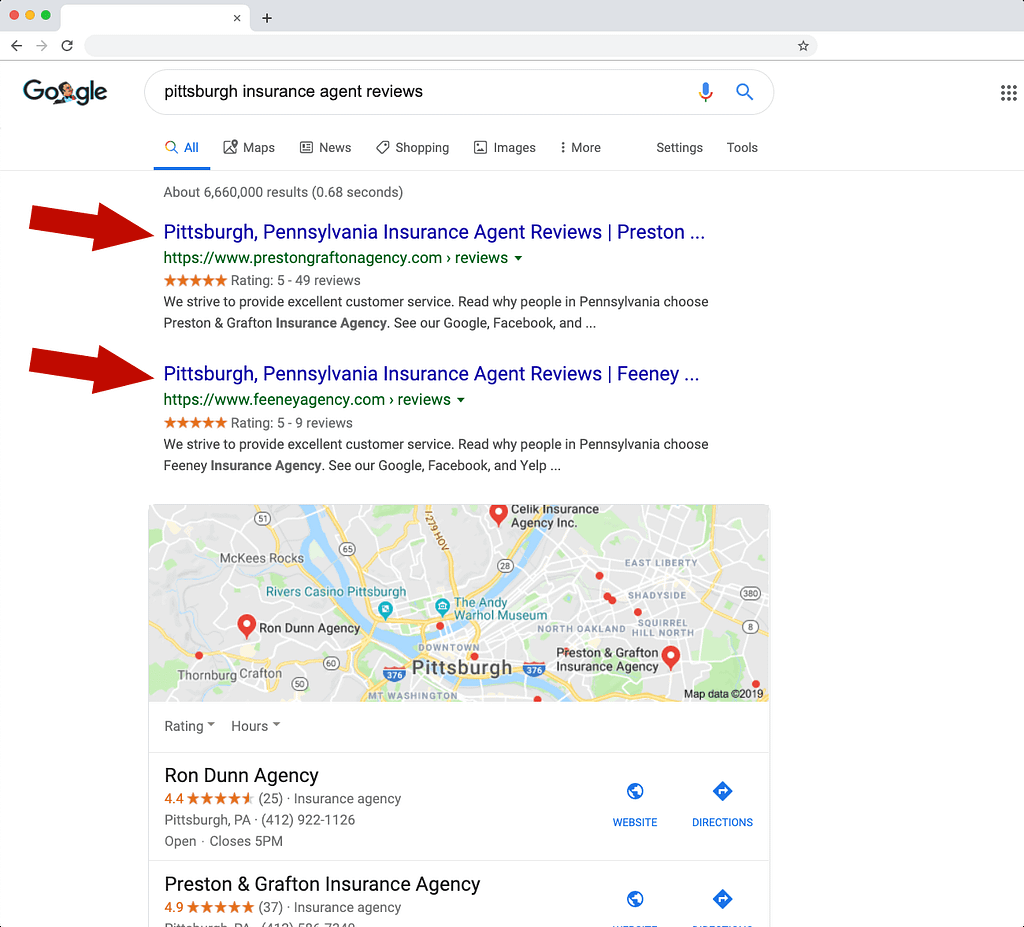
Boost Conversions on Your Website
Because of the prevalence of user review websites, you may think it’s unnecessary to implement reviews on your own website. However, placing authentic reviews from real people on your agency website, especially near contact and quote request forms, can have a major impact on converting a website visitor into a prospect.
At BrightFire, we curate the reviews on your website to make sure they provide the most impact on conversions. We curate your reviews from the most important sites like Facebook, Google, and Yelp.

Reviews will include the review text, review site, star rating, and the reviewer’s photo, when available. The best reviews from a variety of sites will get the most exposure on your website.
74% of consumers will trust a business more if that business has positive reviews.
Source: Luisa Zhou
Part 2 – How Do I Generate Online Reviews?
Key Takeaways
- Most customers will leave a review if asked.
- Fake reviews will have negative consequences.
- Google is by far the most important place to have reviews, followed by Yelp and then Facebook.
Getting Started
The first step in generating online reviews is to make sure you have a business listing at the major review networks (Google Business Profile, Facebook, and Yelp). If you’ve never had a customer leave you a review, it’s likely because it hasn’t crossed their minds.
There are several passive and active ways to generate online reviews.
Passive Methods
- Use a website review widget to feature previous reviews as well as a call-to-action to write a new review.
- Include a link to your website’s review page in your email signature.
Active Methods
- Just ask in person – at the right moments! There are several opportunities to ask your policyholders for a review, such as after you’ve sold them a policy, after you’ve renewed their policy, after in-office service, or after a positive claims experience.
- Send personalized follow-up emails a few weeks after doing business with them.
- Share new reviews on social media and ask for more.
- Publish social media posts directing them to your website’s review page.
- Include a review link in a customer survey or newsletter.
- Mail out personalized postcards that include URLs to your review page.
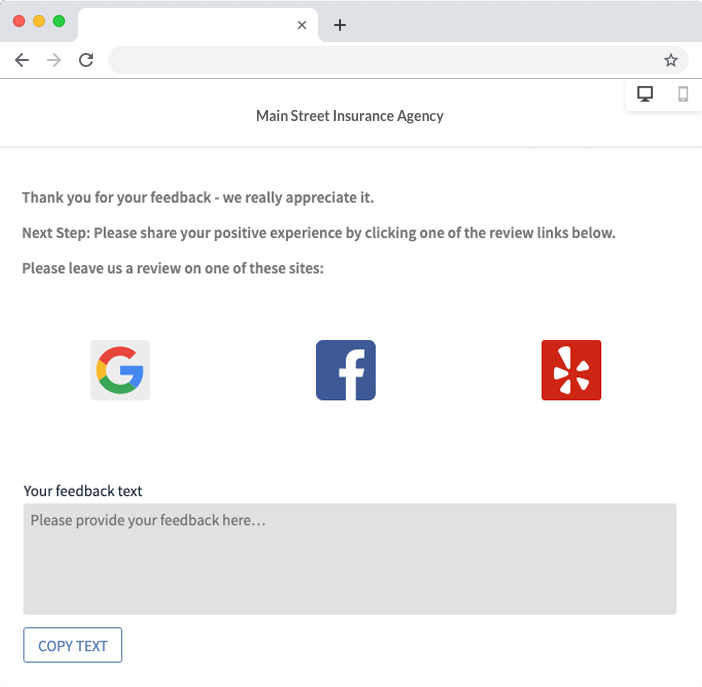
Where Should I Tell Customers To Leave Reviews?
While there are several review websites and services across the web, there are three major review services we recommend to our insurance agents.
Google Business Profile
Google is by far the best place for customers to leave reviews, as these reviews will directly affect your search rankings. Once you have ten positive Google reviews, Google will reward you by giving your site more priority when displaying results to potential customers.
Yelp
Yelp reviews carry less weight than Google reviews, but they still play an important part in maintaining a positive brand name. Millions of consumers use the site and trust the feedback it provides. Yelp reviews control your ranking within Yelp itself, so good reviews can go a long way toward drawing in new customers.
Facebook may not affect your rankings like Google or offer a review-specific service like Yelp, but it is still a critical piece of your larger social media presence and branding. Even if your website looks professional, negative Facebook reviews may make customers hesitant to give you their business. Facebook reviews can also be displayed in the Google Knowledge Graph on the right column of the search results when a user searches for your agency by name, as shown below.
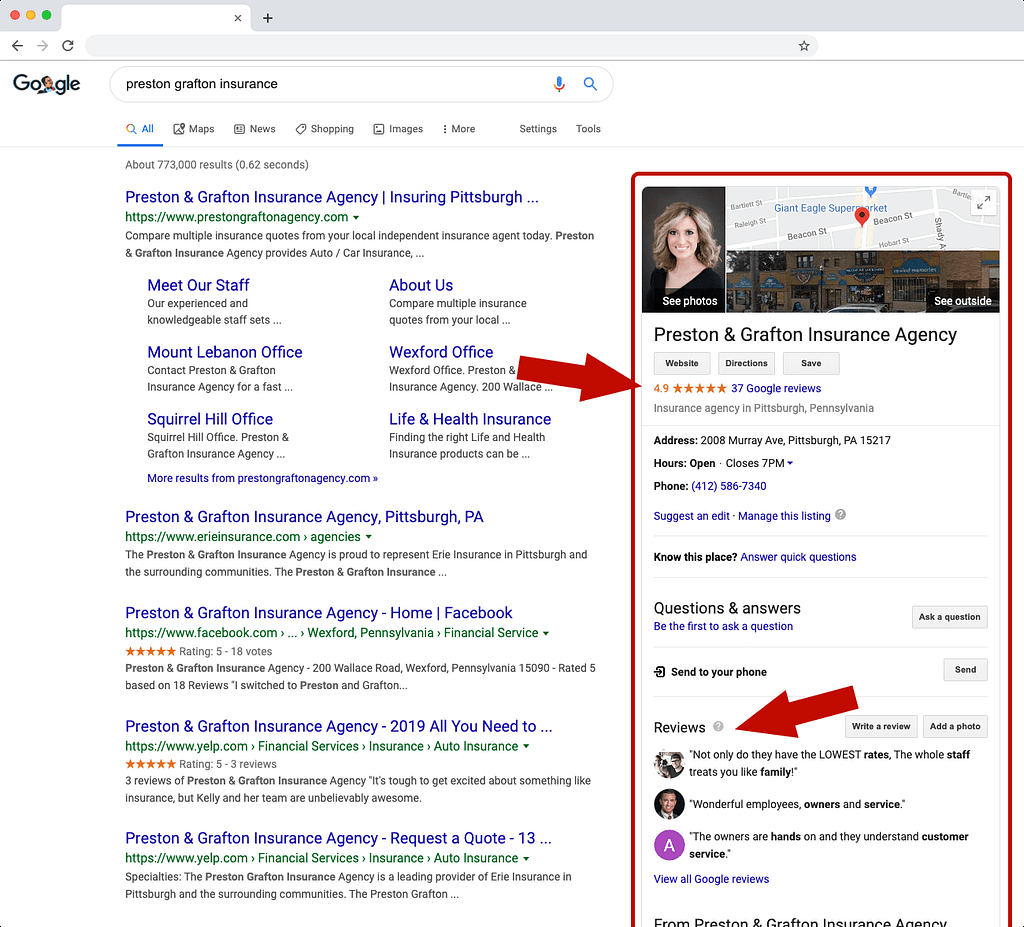
Part 3 – How Do I Respond to Customer Reviews?
Key Takeaways
- Responding to all reviews is a great way to build your brand.
- Negative reviews present unique opportunities to build customer trust and market your agency.
- Spam reviews can be appealed and removed.
Engage With Your Audience (Reviewers & Prospects)
When someone leaves a positive or negative review, it’s important to respond and let them know that you value their feedback. Not only does this show that your business is appreciative, but it also helps you maintain a strong online presence. People who see your replies will have an easier time seeing the human element in your agency, which in turn can make them more likely to give you their business.
What About Negative Reviews?
While a single negative review isn’t detrimental to your brand reputation, receiving several negative reviews can have a crippling effect on insurance agents, especially if the agency has few reviews to begin with. But how you respond to negative reviews can have a stronger effect on consumer trust and your agency’s online reputation than simply receiving them.
It’s important to remember that when you respond to negative reviews, you’re not just replying to that reviewer. You’re speaking to everyone who reads the review, including potential future customers.
Replying to negative reviews shows future readers and prospects that your agency is active online, concerned about customer satisfaction, and taking actionable steps to improve the customer experience your agency provides. It also helps make prospects more comfortable choosing your agency, as a study by BrightLocal found that 88% of people are likely to use a business if they can see the owner responds to all of their reviews.
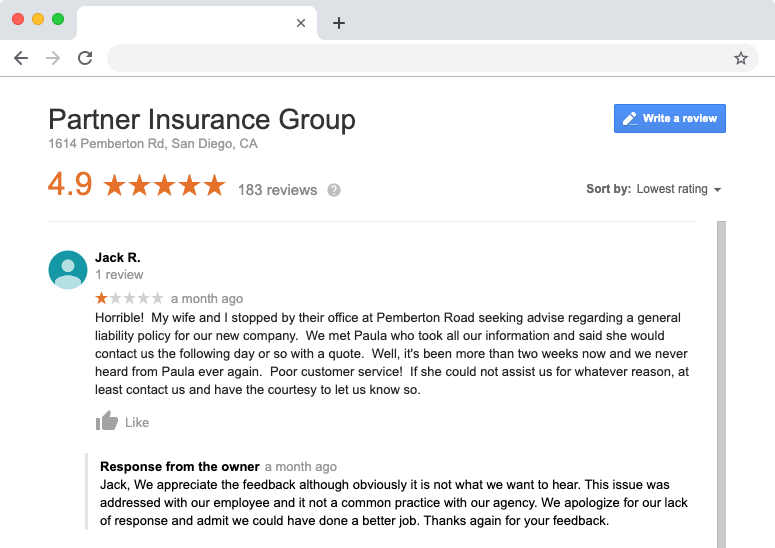
The best thing to do if you receive a bad review is to respond quickly and professionally, since studies show that 53% of customers expect companies to respond to negative feedback within one week (Search Engine Journal). Replying to a negative review is your opportunity to turn a poor situation into a positive one. If a customer brought a complaint to you in person, you would try to make it right. The same holds true for online reviews. Here are some actionable steps to take if you receive a negative review:
Step 1: Apologize and sympathize.
Acknowledge the customer’s concerns, even if you believe they are unfounded. Show sympathy that they had a bad experience. For example, you could say, “I’m sorry to hear about your bad experience.”
Sometimes with insurance agent reviews, the customer had a negative experience with the insurance carrier but left a negative review for the insurance agency because they didn’t understand the difference. Either way, you should respond professionally and accept the blame.
Step 2: Insert a little marketing.
Explain what your customers usually experience at your agency. You could say something like, “We strive to provide every customer with exceptional customer service, and we regret that we missed the mark here.”
Step 3: Move the conversation offline.
The last thing you want with negative reviews is to start an ongoing conversation around the poor customer experience. Provide your contact information and ask the reviewer to contact your agency to further discuss and resolve the problem. For example, you might say, “We would love to better understand your experience and make it right. Please contact us directly at 444-444-4444.”
If the situation is resolved to the customer’s satisfaction, the reviewer is able to remove or edit the original review. In fact, a recent survey by Chatmeter found that 76% of consumers would update their negative review to a neutral or positive one if the company acknowledged and fixed their complaint.
Part 4 – What Should I Avoid When Generating Reviews?
Key Takeaways
- Never pay for reviews or be selective in who can leave a review.
- Don’t force people to only leave reviews on a single platform.
- Don’t avoid or argue with negative reviews.
Don’t Review Gate
Prohibited by Google, review gating is the practice of discouraging or preventing negative reviews or selectively soliciting positive reviews from customers. It’s important to give every customer the same experience and opportunity to leave a review.
Don’t Use Fake Reviews
Reviewing your own business, purchasing fake reviews, or asking friends, family, or employees to review your business when they are not customers are all strictly prohibited. If you know that asking a particular person for a review represents a conflict of interest, avoid asking this person.
Don’t Force Customers To A Single Review Site
To make it as easy as possible for your customers to leave a review, offer them more than one review service. When leaving a review, the customer will need to have an account on that review network. Additionally, some customers may be power users or “local guides” on certain websites, so it’s important to allow your customers to leave reviews on the networks where they are the most active.
Don’t Use Review-Generating Vendor Services
Don’t purchase review-generating services that focus on building reviews on their own service or website. When you cancel your monthly subscription to these services, you will likely lose all of your reviews. Instead, your review-building efforts should be focused on generating reviews directly on review sites such as Google, Yelp, and Facebook. Reviews on these sites are not tied to subscriptions, so they are much more trustworthy and permanent.
Don’t Argue With Reviewers
When you respond on review sites, you’re not just talking to that reviewer. Other potential customers will see how you handle negative feedback, so keep it professional. Seeing how a business handles a negative review can be very telling, and it may provide more insight to a consumer than a positive review.
Don’t Use Text-Only Reviews On Your Website
Website visitors have very short attention spans these days, and they will likely not read multi-paragraph reviews in their entirety. Instead, your reviews page should display snippets of longer reviews, icons of review networks, and profile photos of the reviewers when applicable. This will quickly communicate the quality and authenticity of your reviews to prospects without forcing them to scan pages of text.
Part 5 – How Can I Get More Business from Positive Online Reviews?
Key Takeaways
- Feature your reviews on your websites and in your marketing.
- Displaying reviews can boost your social proof and credibility while influencing purchasing decisions.
- Leverage your reviews to generate referrals from satisfied policyholders.
Once you begin generating new reviews consistently, the next step is to leverage your reviews to get new business. There are several ways to strategically use your reviews to generate new leads and grow your book of business.
Prominently Display Positive Reviews on Your Website
Displaying your positive online reviews on your website can help new visitors trust your agency and encourage them to get a quote online or contact your agency.
At BrightFire, we recommend featuring online reviews on your homepage, near lead forms, and on a customer reviews page dedicated to allowing website visitors to read multiple positive reviews in one place.

Use Reviews in Your Marketing
Whether you create print materials like brochures, or focus on digital marketing such as email marketing, social media marketing, or pay-per-click advertising, you should incorporate positive reviews into your marketing materials.
This can serve as social proof, bolstering your agency’s credibility and ultimately helping to influence prospects to do business with your agency.
Leverage Reviews to Generate Referrals
Studies show that a single happy customer can yield nine referrals (Oberlo), and leads generated from referrals often see a conversion rate 30% higher than those from other marketing avenues (Finances Online). With this being the case, your agency should leverage your online reviews and satisfied policyholders to generate referrals.
There are several ways to ask your customers for referrals, including in person, email, social media, SMS text messages, over the phone, flyers in your office, and business cards. However you choose to ask for referrals, be sure to thank your policyholders for their loyalty, any online positive reviews they may have left your agency, and the time and effort they gave to share referrals with you. You can even consider incentivizing your referral program to encourage customers to provide you with higher-quality referrals who are more likely to contact you and get a quote from your agency.
At BrightFire, we help agents generate more high-quality leads by leveraging their happy customers and asking them to refer their agency to friends and family.
Our Automated Referrals feature included in our Reviews & Reputation Management service sends emails to satisfied policyholders asking them to refer their family and friends. These emails are triggered when the agency receives a 9 or a 10 on an NPS customer survey or a 5-star Google review.
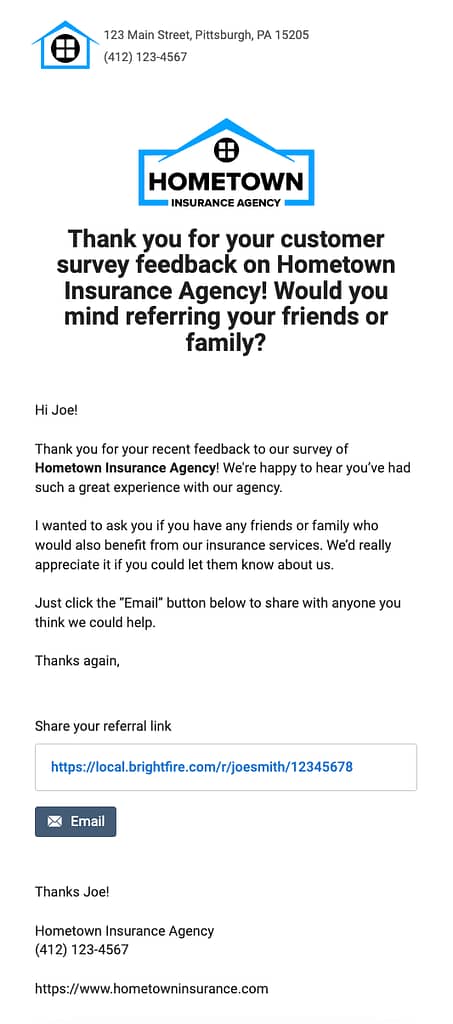
Additionally, we offer BrightFire-Managed Referral Generation Campaigns that allow your agency to send referral emails and automated reminders to an entire contact list of your choice all at once twice each year. These bulk email campaigns will save your agency time and energy while helping you build your book of business through warm, high-converting insurance leads.
Part 6 – How Do Online Reviews Fit Into Your SEO Strategy?

We’ve already touched on how consistently generating positive online reviews can help your agency rank higher in Google. But search engine optimization (SEO) entails much more than just your online reviews.In fact, there are three main components to a successful long-term SEO strategy: a consistent stream of positive customer reviews, website optimization, and accurate, well-managed local listings. BrightFire offers the Ultimate SEO Bundle that covers each of these three bases to help your agency stand apart from your competition and attract new insurance buyers.
Reviews & Reputation Management
Online review sites like Google, Yelp, and Facebook help strengthen your SEO strategy while also improving your brand’s reputation in the eyes of your prospects and customers.
To maximize the SEO benefits you can reap from online reviews, your agency must properly set up, monitor, and manage your online reputation and customer review sites. But with dozens of review profiles to keep track of, BrightFire is here to help your independent insurance agency grow, nurture, and protect its online reputation with ease.
Our Reviews & Reputation Management service is a great solution for generating reviews from your clients while improving your online rankings, gauging your customer’s happiness, and staying connected with your customers.
Insurance Agency Websites
Offering everything your agency needs to attract and convert insurance buyers online, BrightFire’s Insurance Agency Websites are optimized for the insurance policies your agency sells. As a certified Google Partner, BrightFire stays abreast of Google’s updated services, policies, and ranking factors to make updates behind the scenes of each of our client’s websites so they don’t fall behind in search rankings.
Our digital marketing experts take thorough care of your website, managing and installing updates, monitoring security, and ensuring that everything runs smoothly.
Local Listings Management
From Google and Yelp, to the Better Business Bureau (BBB), Yellow Pages, Tom Tom, and more, the number of local business listings (also called citations) generating information about your agency for consumers to find online is endless.
And while it’s great for your agency to be represented on so many platforms, it becomes increasingly important and difficult to manage each listing and ensure your agency’s information (i.e., website, name, address, phone number, etc.) is correct on each one.
With BrightFire’s Local Listings Management service, our digital marketing experts help your agency get found across the web so consumers can easily reach your agency, with or without visiting your website. Our team accomplishes this by ensuring your business information is accurate and consistent on more than 50 local listings across the web, including Google, Bing, Apple Maps, Google Maps, and major data aggregators. We also keep an eye out for duplicate listings and remove any we find, as these can negatively impact your SEO rankings.
